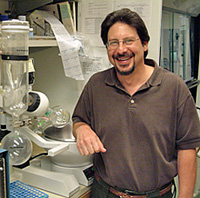2007 Karl Meyer Award Winner
Dr. Esko's research focuses on the structure, biosynthesis, and function of proteoglycans. Proteoglycans constitute a relatively small group of glycoconjugates and are present in the extracellular matrix, on the cell surface and in secretory vesicles, where they play essential roles in cell signaling, development and physiology. Dr. Esko's work is best characterized as multidisciplinary, spanning chemistry, biochemistry, cell biology, and genetics, focused on understanding the structure and function of the glycosaminoglycan chains found on proteoglycans. He is well known for his early work on the development and biochemical characterization of mutant Chinese hamster ovary cell lines altered in glycosaminoglycan metabolism. These mutants have been used by hundreds of laboratories worldwide and serve as the benchmark for the analysis of mutants in other cell types and model organisms. Studies of the CHO cell mutants and mice bearing conditional and systemic mutations have allowed his group to analyze heparan sulfate function in normal physiology and disease. One area of interest concerns the role of proteoglycans in the turnover and clearance of triglyceride-rich lipoproteins. These studies led to the first genetic evidence that hepatic clearance of lipoproteins depends on a single proteoglycan called syndecan-1. Syndecan-1 acts as an endocytic receptor and works in parallel to, but independently of members of the LDL receptor family. Recent studies focus on macrophage proteoglycans, foam cell conversion and atherosclerosis. His group has studied the interaction of heparan sulfate with various signaling receptors on endothelial cells, demonstrating the role of these complexes in pathological angiogenesis and vascular hyperpermeability. Through many collaborative studies, his lab has worked with a variety of microorganisms, demonstrating the role of heparan sulfate proteoglycans in attachment and invasion both in vitro and in vivo. Dr. Esko has had an ongoing interest in chemical strategies to treat human diseases related to aberrant synthesis and degradation of glycans. He developed small molecule metabolic decoys that act as primers of glycan biosynthesis and inhibitors of glycoconjugate formation, and worked out simple methods to introduce these agents into cells. One class of compounds consists of a disaccharide and disaccharide analogs related in structure to Sialyl Lewis X. These agents have the capacity to block tumor metastasis by preventing platelet association with tumor cells in the vasculature. This finding led to the development of high throughput screening methods to identify small molecule inhibitors of glycan formation and to the first small molecule antagonist of heparan sulfate function (surfen), work that is now being carried on by Zacharon Pharmaceuticals, Inc., which he cofounded. In collaboration with Yitzhak Tor's group in the Department of Chemistry and Biochemistry at UCSD, he developed a carrier system based on guanidinylated glycosides. These carriers bind to proteoglycans and facilitate delivery of high molecular weight cargo into the interior of the cell by piggy backing on the heparan sulfate chains. The carrier system is currently being tested in vivo as a way to treat lysosomal storage disorders. His group also has developed novel mass spectrometry techniques to determine the disaccharide composition of glycosaminoglycan chains, which has led to a technique for diagnosing aberrant lysosomal storage of glycosaminoglycans (mucopolysaccharidoses). Throughout his career, Dr. Esko has maintained a keen interest in education. In addition to training numerous students and fellows, he has played an active role in organizing graduate education and outreach activities. Thus, it is most appropriate to recognize of his many contributions by the Karl Meyer award. |

 Jeffrey Esko, PhD
Jeffrey Esko, PhD